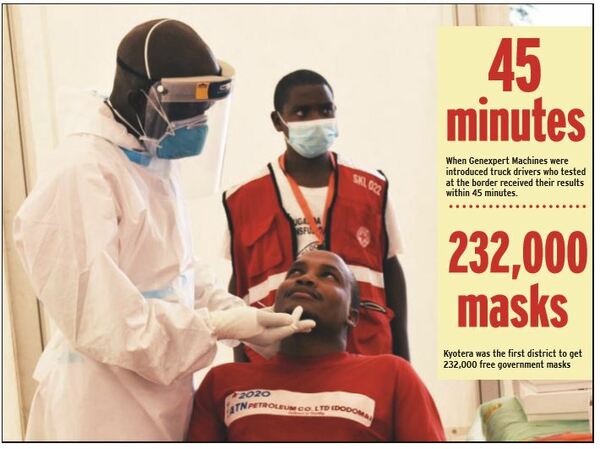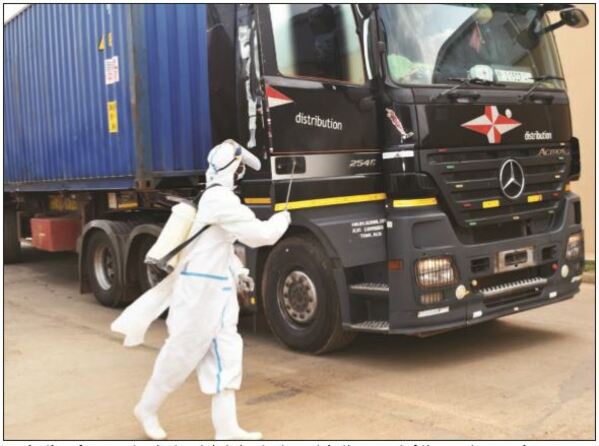How the Government's response to COVID-19 saved lives
The Ministry of Health attributes the country’s achievement to its quick response to the pandemic.
The Lancet Medical Journal recently lauded the Ugandan government for its preparedness in combating the coronavirus (COVID-19).
The global rankings placed the country in the 10th position after Taiwan, Thailand, Vietnam, Lao People's Democratic Republic, Cambodia, China, Myanmar, Malaysia and New Zealand for their effort in COVID-19 suppression in August.
This made it the best on the African continent followed by Togo, Rwanda, Democratic Republic of Congo and Nigeria. The attainment was announced by the Lancet Covid-19 Commission during the 75th session of the UN General Assembly.
The Ministry of Health attributes the country's achievement to its quick response to the pandemic to save its people from the catastrophe that has so far claimed the lives of more than one million people globally.
Uganda recorded her first case in April 2020 at the time when the virus had claimed tens of thousands of people in China, Spain, Italy, India, Brazil, the US and others countries in Africa.
LOCKDOWN
In March, President Yoweri Museveni was compelled to effect a lockdown to contain the spread of the virus. As a result, Entebbe International Airport and all land border points across the country were closed.
The education institutions, schools, churches, mosques, markets, bars, clubs, malls and arcades were closed to limit gatherings. In addition, public transport was suspended and curfew enforced.
Later, the ministry devised the Standard Operation Procedures (SOPs), including washing hands with soap, wearing of masks and maintaining physical istance
which saved the majority of Ugandans from getting infected.
Although the country had so far registered 85 as of Tuesday COVID-19 deaths, Dr Charles Olaro, the director Curative Services at the health ministry, argues that the number of deaths would have been overwhelming if it were not for the quick interventions the country took.
ISOLATING THE SICK
Olaro added that the decisive actions by the Government such as early lockdown and early communication of COVID-19 messages to the public through different channels also enabled people to understand what to do to protect against infection.
He explained that they quickly isolated the sick from the communities, , which helped to minimise infections.
"We were able to identify those who are positive in time and trace their contacts. We isolated them to save the majority from getting infected," he noted.
According to Olaro, there were several aspects including forming of different task force teams at the local and national level in addition to the role of health workers who set up different teams to combat the disease.
FREE MASKS
He said, the distribution of free Government masks in different districts, especially those at the border, protected the people.
Kyotera was the first district to get 232,000 free masks followed by Rakai and other vulnerable districts. Apart from government contributions, Olaro added that the public's response towards the campaign against COVID-19 was crucial.
"They played a big role in supporting the campaign through donations in terms of Personal Protective Equipment (PPE), food and vehicles to ease COVID operations in all districts.
TESTING TRUCK DRIVERS
In May, the Government ordered for mandatory COVID-19 testing for all cross-border truckers. This was a presidential directive which saw the introduction of a Truck Driver Journey Management System (TDJMS), to enable health officials and different task force teams to track the movement of cargo trucks and the drivers.
Initially, the truckers would be allowed to proceed with their cargo after collecting COVID-19 samples from them. But tracking the drivers whose results returned positive for COVID-19 was hard.
However, in the same month, the Genexpert Machines were introduced to ease the testing of drivers at the borders. They would be tested and receive their results within 45 minutes.
At Mutukula, a Uganda-Tanzania border post, the truck drivers who tested positive for COVID-19 were immediately taken to the regional treatment centre in Masaka while others to Kampala and Entebbe.
Dr Edward Muwanga, the Kyotera district health officer, said those who are negative are allowed to go. "The suspects are put in isolation centres to avoid further transmission," he said.
SENSITISATION
Dr Nathan Onyach, the director Masaka Hospital, said they are intensifying sensitisation of elderly people and patients with comorbidities in the region to save them from contracting and succumbing to the disease.
According to Onyach, people with comorbidities are at high risk of succumbing to COVID-19. He explained that comorbidities are a condition where a person has multiple medical conditions at the same time.
He noted that the elderly and people with cardiovascular diseases, diabetes, hypertension and cancer plus their caretakers must be implored to wear masks, wash hands and maintain physical distance.
Onyach further attributed the success in suppressing COVID-19 to the press, which tirelessly reported extensively on the matter.

COMMUNITY TESTING
In May, the health ministry in collaboration with the World Health Organisation recommended community testing following the increasing threat around the borders and landing sites.
Dr Diana Atwine, the health ministry permanent secretary, visited Masaka following reports that residents at Kasensero landing site, Mutukula and Nangoma Island (sub-county) were crossing to Tanzania which had registered a considerable number of cases at the time.
Two weeks later, the ministry dispatched a health team led Dr Ronald Regan Mutebi to do surveillance and random sampling and testing. The sick were taken to different treatment centres while contacts were put in quarantine centres and some encouraged to selfisolate for 14 days.
"This is how we managed to contain the spread of the virus in these communities. By early July, Kasensero had recorded 16 community cases, Nangoma had 11 cases and Mutukula village had 40 cases. We have not received any other cases from the two
communities," he said.
RED CROSS INTERVENTION
Collaborating with the Government, the Uganda Red Cross Society intensified fumigation of cargo trucks at every entry point since March when the lockdown was directed. Robert Kwesiiga, the URCS secretary-general, said they had also trained teams to conduct burial of COVID-19 victims.
He noted that poor handling and burial of COVID-19 victims could cause more infections and deaths.
According to Irene Nakasiita, the co-ordinator communications, they have been present in various communities, conducting social mobilisation and risk communication activities in collaboration with the government, through the ministry of health.
She added that all border points will be subjected to the same safety procedures to contain the spread of COVID-19.
POROUS BORDER CONTROL
The army and Police deployment at Mutukula and along porous borders in Rakai and Kyotera districts have helped to intercept and quarantine people from Tanzania who cross to Uganda.
A 305th Battalion was set up at Sango bay to enforce security at the border post and patrol the porous entry points. Maj. David Matovu, the Kyotera Resident District Commissioner, explained that the COVID19 problem shifted from the border points where it was known among the truck drivers to the communities.
He said they are looking for resources to put up different institutional isolation centres. "Once we get the resources to run the centres then we shall not keep sick people in the community," he said.

EARLY TIMELINE FOR COVID-19 RESPONSE
-To contain the potential spread of coronavirus, President Yoweri Museveni, in a televised address to the nation on March 18, communicated a Cabinet decision to place the country under a partial lockdown for 32 days as one of the measures to curb the spread the coronavirus.
-During the lockdown, 40 more restrictions, including the closure of education institutions; suspension of mass gathering such as political rallies, communal prayers, big weddings and funerals, were put in place.
-The President said all primary and secondary schools, university and other institutions of learning would be closed effective March 20, for one month.
-Public rallies and cultural meetings were also suspended for 32 days.
-Private vehicles were allowed to move but with a restriction of three people per vehicle, including the driver.
-The President also banned Ugandans from travelling to high risk countries.
-On March 21, all public transport was suspended, non-food stuff shops in public markets were closed to and food vendors who were cautioned against making unnecessary trips to and from home.
-On March 22, the country registered the first COVID-19 case.
-On March 25, the President stopped all people coming into Uganda by air, land or water; he stopped pedestrians trekking on foot from Uganda's neighbors in East Africa.
-Returning Ugandans were quarantined at their cost at different isolation facilities in Entebbe.
-On burials, Museveni directed they be conducted by close relatives but if the death is related to COVID-19 the government would intervene.
-On March 30, after authorities discovered that unregulated private car owners were using their cars to ferry passengers at exorbitant rates, a lockdown for 14 days starting April 1 was instituted.
-On April 6, the Central Bank of Uganda, reduced the Central Bank Rate (CBR) to its lowest ever 8% down from 9%.
-Bank of Uganda also announced measures such as loan holidays for affected customers.
-On April 9, the President released a video demonstrating to Ugandans how to exercise from home to encourage Ugandans to stay home during the lockdown.
-Compliance with standard operating procedures (SOPs), especially washing hands and social distancing were religiously adhered to.
-The fear of contracting the disease stood between 70% and 80% between March and May, according to survey results from the ministry of Health.
-At the end of July, WHO regional director for Africa Dr Matshidiso Moeti praised Uganda, for effectively managing to control the spread of the pandemic on the continent.